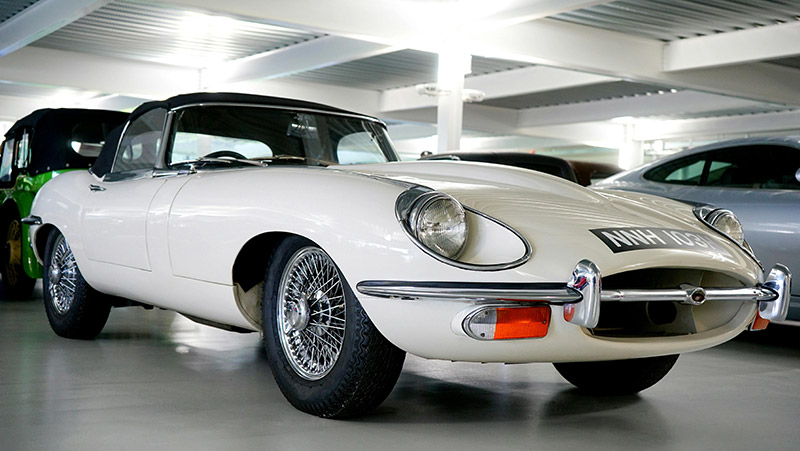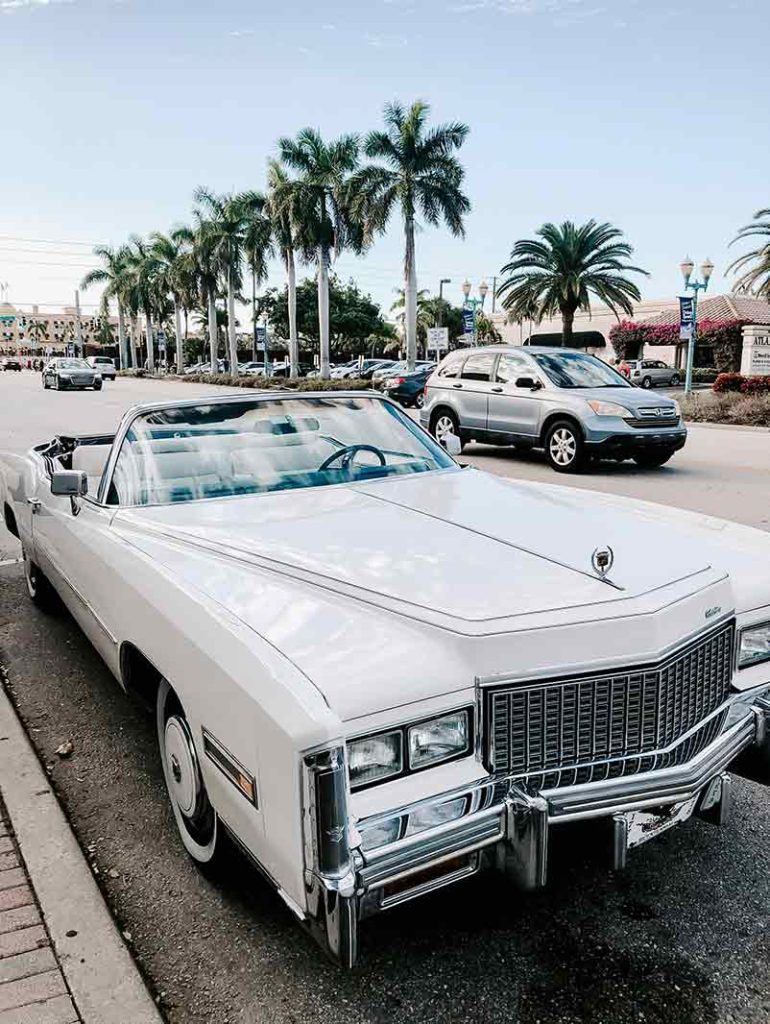Classic Car Insurance Florida Ultimate Guide – 2025:The roadways of sunshiny Florida, with their colorful car culture and an almost endless stretch of coastal highway, are a paradise for classic car buffs.
Dreaming of owning a vintage vehicle in the Sunshine State and either cruising along Ocean Drive or showcasing at weekend car shows? However, these automotive gems need coverage beyond a basic auto policy. Standard policies typically fall short of ensuring the classic car’s unique value and rarity, and they don’t compensate for the more fragile craftsmanship often seen in classic cars.
This is where specialized classic car insurance comes in, providing collector vehicles with dedicated coverage that increases in sentimental and financial value. With changing regulations, rising repair costs, and the impact of risk factors such as hurricanes and floods, it’s more important than ever to understand how to secure coverage in Florida in 2025. From agreed value coverage to usage restrictions and storage needs, this blueprint will aid owners in preserving and protecting their treasured automobiles for years to come.
What Is Classic Car Insurance?
Classic car insurance is a unique type of policy explicitly designed to protect cars that have historical value, rarity, and lasting appeal to collectors. While classic car insurance recognizes that vintage vehicles tend to hold value and often appreciate, regular auto insurance depreciates the car’s worth over time. Not only do these policies feature agreed value — meaning the insurer and owner decide what a fair value for the vehicle is when purchasing the policy ahead of ownership — but in the case of a total loss, the payout is guaranteed to match that agreed value, as there’s no will-it-or-won’t-it value depreciation debate going on.
Such coverage also accounts for how there may be restrictions on use with classic cars (similar to classic cars themselves, They’re not daily drivers, but prized possessions, rarely ever driven except for shows, car exhibitions, and maybe to dine on occasion). Policies can also cover things like rare parts, special modifications, and restoration efforts. A classic car insurance policy puts up a protective bubble not just around a car but around an era of automobile design and manufacturing.
The Differences Between Classic Car Insurance and Standard Auto Insurance
Standard auto insurance pays out based on the depreciated market value of the vehicle, leaving classic car owners significantly underinsured in the event of a loss. In contrast, classic car insurance is designed around agreed-value coverage. So, owners always get an amount that’s agreed upon and one that genuinely reflects the collectible and often appreciated value of their vehicle. These policies take into account how classic cars are not driven like a daily driver.

Consequently, they include specific mileage limits to protect the cars from extra wear and to keep the vehicle’s value. Insurers also may need specialized care, often requiring secure, climate-controlled storage to keep the vehicle in good shape. In fact, classic car insurance usually covers rare spare parts and custom modifications, understanding the difficulty and expense of restoring and maintaining vintage automobiles. It’s complete security for investments that go beyond customary automotive ownership.
Why Is Florida Classic Car Insurance Important?
Florida’s tropical climate, despite its beauty, presents unique challenges for classic car owners. High humidity speeds up rust, salt air eats away at delicate finishes, and hurricane season brings a perpetual risk of flooding and storm damage. These environmental hazards can cause a perfectly restored classic car to rot in just a few seasons. However, classic car insurance in Florida provides more than just typical protection — it covers these climate-related risks. Most policies cover weather-related events in full, so collectors aren’t left exposed. With the right insurance, owners can feel secure pursuing their passion and keeping their coveted cars in mint condition, even amid the unpredictable weather of the Sunshine State.
Requirements to Qualify for Classic Car Insurance in Florida
Age of Vehicle
Most insurers define a classic car as a vehicle at least 20 years old that has been well-preserved and maintained primarily for display or recreational use and not for daily commuting. Definitions do, however, vary slightly between providers. Some insurers even offer classic car coverage starting at vehicles 10 years old or younger if they have collectible status, low production numbers, or special historical significance. Also at play are factors such as rarity, custom tweaks, and just what the market will bear. Generally, the vehicle must be in excellent or fully restored condition, and owners often must have another car for day-to-day use.
Usage Restrictions
Classic car insurance policies usually place restrictions on these vehicles, limiting recreational use, which means they aren’t designed to be driven on daily commutes or for commercial purposes. Many insurers also require owners to have another primary vehicle that they drive regularly. This minimizes the risk of having a classic car be used as a daily driver, which, in turn, helps to keep the vehicle in top condition on the road, preserving the collectible value. Enforced usage restrictions are a big part of how that full coverage remains affordable while preserving classic car integrity.
Storage Requirements
Storage Need: This is one of the main requirements of classic car insurance. Insurers frequently require vehicles to be stored in secure, temperature-controlled garages to shield them from extreme elements, humidity, or vandalism. Such precautions secure the car’s conservation, which is meant to help preserve its condition and value. Not meeting storage requirements can result in policy exclusions or lower payout if you end up having to make a claim.
Types of Classic Cars Covered:
Antique Cars
Antique cars—those made before 1975—require specialized coverage that falls under classic car insurance policies. Due to their value as a piece of history and rarity, these vehicles are usually afforded blanket coverage. They are thus worth more to insure on an insurance payout basis, meaning owners are compensated fairly in the event of a total loss. This higher valuation reflects their collectible status, one that drives up the value of a vehicle when it is escaped or restored.
Vintage Cars
Such vintage vehicles from the early days of the last century are insured only after an extensive appraisal, owing to their extreme rarity and often fragile condition. They need to be priced right because they have historical value, and the potential for restoration is expensive. Insurers usually work closely with appraisers to ensure a well-calibrated coverage that protects the unique value of vehicles.
Modified and Custom Cars
Policies from specialty classic car insurers cover even heavily modified or custom-built classic cars. These vehicles are afforded an appraisal that considers the labor, craftsmanship, and bespoke components involved in their construction. Insurers understand that such vehicles are unique and offer coverage that reflects both their customization and market value.
Muscle Cars
Legendary muscle cars such as the Ford Mustang or Chevrolet Camaro are insured with specialized coverage that factors in their market value, performance upgrades, and historical context. Such vehicles often require custom policies that account for the increased value due to, say, upgraded engines, suspension systems, or custom bodywork. Some muscle car insurance companies specialize in muscle car coverage with various coverage options to suit your unique needs, protecting both your base vehicle and any modifications you choose to make. This type of coverage helps protect these cherished cars, retain their value, and ensure that in case people lose or damage them financially, they are covered.
Agreed Value v. Actual Cash Value Policies

Agreed value policies set a specific payout amount that is not subject to depreciation disputes. Actual cash value policies, on the other hand, take depreciation into account, which can lead to lower claim payouts.
Key Coverage Options
Liability Coverage
As with other insurance policies, the liability coverage included in classic car insurance is intended to protect against bodily injury and property damage if the driver at fault is insured. It covers the driver’s financial and legal liabilities as well as medical and repair costs.
Comprehensive Coverage
Comprehensive coverage in classic car insurance covers theft, fire , and acts of nature, such as the hurricanes Florida often faces. This guarantees that owners will be compensated for damages resulting from unexpected occurrences, which helps to maintain the vehicle’s worth and condition.
Collision Coverage
Collision coverage applies to classic car insurance and pays for repairs or replacement costs after an accident, regardless of fault. This guarantees that the vehicle is returned to its pre-crash status without the owner, i.e., not incurring the cost.
Uninsured Motorist Protection
Florida has one of the highest rates of uninsured drivers, making uninsured motorist coverage imperative. If you get into an accident with someone who isn’t insured, you can receive compensation without needing to pay out of pocket, giving classic car owners added peace of mind.
Spare Parts Coverage
Spare parts coverage is frequently neglected, but it is essential for classic automobile owners. Long Story Short, it offers reimbursement for stolen or damaged rare parts and components so the car can be properly restored without the significant additional costs of seeking out the right bits and pieces.
Roadside Assistance
Because of their age and atypical parts, vintage cars can be prone to sudden breakdowns. Roadside support is a must for owners of classic cars, especially during long-distance rallies or road trips when owners don’t want to be stranded. This includes peace of mind for owners, with services such as towing, flat tire assistance, and emergency fuel delivery so owners of classic cars can drive without worry.
Exclusions to Be Aware Of
Daily commuting, racing, or commercial use are standard exclusions in classic car insurance policies since these activities increase risk and these activities are not covered. It might also be the case that some of these insurance policies include disclaimers for improper storage or unauthorized modifications to the car, which could impact its value or condition. Always read the fine print to confirm your vehicle meets the guidelines of any insurance policy.
How Florida Premium Costs Are Impacted?
Driver’s Age and History
Mature, low-risk drivers usually get lower premiums due to favorable driving histories. However, young or higher-risk drivers might also pay higher premiums or sustain surcharges because of the higher likelihood of accidents or claims.
Vehicle Condition and Rarity
Vehicles that are highly restored or rare, in particular, typically claim much higher premiums because the costs for replacing them are so much higher. Because restoring or replacing these vehicles requires specialized labor and rare parts, insurers customize their RAEs, making these vehicles more expensive to insure.
Storage Facilities
They get lower insurance rates for vehicles that are locked away in climate-controlled places. This is because these types of storage conditions help maintain the car’s condition, allowing it to minimize damage from environmental factors such as humidity, temperature, and other factors such as rust.
Mileage Limitations
Annual mileage is lower for classic car owners, which may result in lower premiums. With limited use, insurers see less risk because fewer miles driven translate to fewer accidents, wear, or damage. Owners can benefit from lower rates by restricting the use of their vehicle, but they can still enjoy taking the classic for a spin on sunny days or lending it for special occasions.
Best Classic Car Insurance Companies in Florida
Some major players in classic car insurance in Florida include Hagerty, Grundy, American Collectors Insurance, and J.C. Taylor, each providing different benefits for their coverage. Hagerty is recognized for its flexible mileage plans and a great community of auto lovers. Grundy provides alternative options like agreed value coverage and multi-car discounts. American Collectors Insurance offers customizable policies with strong customer service, and J.C. Taylor stands out for its low premiums and coverage options that span a wide range of vintage vehicles. These custom products are made available to ensure that owners find the best products for their classic cars.
Getting a Classic Car Insurance Quote in Florida
Potential policyholders should gather piercing docs for their classic ride, including detailed photos, appraisal certificates, and restoration receipts. That documentation helps substantiate the value and condition of the vehicle to make sure it is adequately covered.
Although a number of insurers have online forms for quotes, it’s best to speak to a specialist to ensure that the policy truly matches the unique needs of the vehicle. A specialist can clarify coverage options, discuss exclusions, and tailor the policy to the specific needs of the car. It ensures peace of mind and avoids any lost coverage by taking the time to speak with one of the industry experts.
How Classic Car Insurance in 2025 Can Save You Money?
If you’re a collector, bundling several classic vehicles with one insurer can lead to discounts on the policy side, as insurers often offer multi-vehicle discounts for collectors with multiple cars. A clean driving record also helps keep premiums low; insurers consider low-risk drivers to be less likely to file claims. Joining collector car clubs can bring exclusive discounts, too, as insurers often view members of those organizations as more dedicated to taking care of their vehicles.
Ask about multi-policy bundles that combine home and auto insurance with your classic car coverage for more savings. Not only does bundling policies make managing your insurance easier — but it can also lead to meaningful discounts, making it a financially savvy choice for coin collection at cost-sensitive collectors.
Common Mistakes to Avoid:
For guidance on claims, such as avoiding under-valuation, securing your documentation, and keeping up-to-date odometer readings, so lose out on a payout or face complete rejection. Accurately assessing the vehicle’s worth and maintaining detailed documentation of the vehicle’s condition, modifications, and mileage are important factors. It should also be updated regularly so that your insurance reflects the car’s actual value rather than how much you’ll potentially lose if you ever need to make a claim. Honesty with your insurer and proper documentation to support your claims are vital to keeping reliable coverage.
How to File a Claim Correctly?
When making a claim, notify your insurer immediately, submit clear pictures of the damage, and include police reports whenever relevant. You should also speak to your appraiser to make sure he documents the vehicle’s value accurately. Insurers like to see more than less information, and it can facilitate the handling of the claim that gets you the proper amount for your classic car.

Florida Laws Governing Classic Cars:
In Florida, like in the rest of the United States, state law requires that all vehicles, including classic cars, have at least a minimum level of liability coverage. Bodily Injury and Property Damage Liability It protects the owners financially in case of bodily injury or property damage due to an accident. Classics need more than just liability coverage; the same will apply to the antique/collector plates that need to be shown on them in order for the vehicles to be considered non-daily drivers.
Such specialty plates generally come with some benefits — including reduced registration fees and entry into select events. They do, however, also come with restrictions on how often you are able to use the vehicle. It’s also vital that the car is properly registered and insured to meet the state’s requirements while protecting the vehicle itself.
Seasonal Use and Special Considerations:
This is where seasonal usage policies come in handy, particularly for classic car owners in places like Florida, where vehicles may not be seen on the road for the entire calendar year. These coverages that open up during the dormant months enable reductions in the coverage when the car is out of use. This way, owners avoid paying for unnecessary coverage while still protecting themselves against common risks such as theft, fire, or weather damage, protecting both the vehicle and their wallet.
Florida Classic Car Insurance: Natural Disasters Impact
Florida classic cars face significant threats from flooding, hurricanes, and tropical storms. You need to make sure that an all-risk insurance policy covers water damage and the risks associated with it. Also, owners should make sure that their storage locations are fortified against such elements as flood-resistant garages or move vehicles to the safest place during storm seasons. You have nothing to worry about as long as your classic car is well protected from the wrath of nature.
Frequently Asked Questions
Q. Can I use my classic car every day?
No, classic car insurance limits the vehicle’s usage to recreational purposes.
Q: How about my classic car , which I upgraded?
Make sure to make an immediate report to adjust the coverage and valuation.
Q: Are classic car insurance policies valid in other states?
Yes, but always look for mileage limitations and coverage radius clauses.
Conclusion
Having a classic car in Florida is not just an exciting privilege but also a big responsibility. Florida’s stunning landscapes and coastal drives lend themselves to displaying a vintage vehicle. Still, the state also presents particular risks to classic cars, including severe weather, humidity, and the risk of flooding. Classic car insurance is critical to protecting these priceless gems. With customized coverage, owners can secure their vehicles from unforeseen disasters, including storms, theft, and accidents.
Additionally, it prevents classic car owners from having to pay out of pocket in case of damage or loss. With the proper protection in place, enthusiasts can enjoy their cars with confidence, knowing they have peace of mind for each drive, from a car show to a country cruise on the scenic roads Florida has to offer. Not only does classic car insurance protect a vehicle’s value, but it also enables an owner to enjoy the pleasure of ownership without apprehension.
<script type="application/ld+json">
{
"@context": "https://schema.org",
"@type": "BlogPosting",
"mainEntityOfPage": {
"@type": "WebPage",
"@id": "https://ricardobiz.com/classic-car-insurance-florida/"
},
"headline": "Classic Car Insurance Florida Ultimate Guide – 2025",
"image": [
"https://ricardobiz.com/wp-content/uploads/2025/03/Classic-Car-Insurance-Florida-Ultimate-Guide-2025-3.jpg",
"https://ricardobiz.com/wp-content/uploads/2025/03/Classic-Car-Insurance-Florida-Ultimate-Guide-2025-2.jpg",
"https://ricardobiz.com/wp-content/uploads/2025/03/Classic-Car-Insurance-Florida-Ultimate-Guide-2025.jpg",
"https://ricardobiz.com/wp-content/uploads/2025/03/Classic-Car-Insurance-Florida-Ultimate-Guide-2025-5.jpg"
],
"author": {
"@type": "Person",
"name": "ricardobiz.com",
"url": "https://ricardobiz.com"
},
"publisher": {
"@type": "Organization",
"name": "https://ricardobiz.com",
"logo": {
"@type": "ImageObject",
"url": ""
}
},
"datePublished": ""
}
</script>
